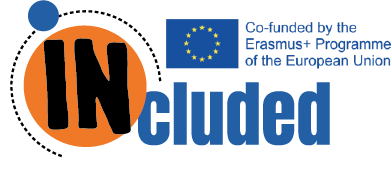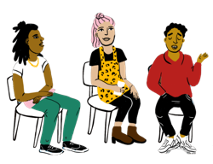An inclusive sex-ed approach through creative methods
We are happy to announce that the handbook outlining the curricular training program for students of the Erasmus+ project “Included: Inclusive sex-ed through creative methods” is now available through project website!
The Included project partnership has completed a review aimed to identify the national situation in terms of sex-ed in each country and identifying the best practices found in each national context. From this information, the training program was constructed placing great emphasis on the inclusiveness of the curriculum. This program aims to support teen-age students, including those with intellectual or physical disabilities, to effectively achieve the core learning-outcomes of sexual education, according to WHO standards.
The handbook is published in all partner’s languages (English, Spanish, Greek, Italian, Dutch and Macedonian), all downloadable for free from the project website at this link: https://includedproject.eu/educational-resources/
Our experience
The sex education program developed was piloted by each project partner in secondary schools to test the activities and training modules in classrooms, where students with disabilities were also present. We want to leave you with some accounts of the piloting experience carried out by five partners in their different countries, along with some photographs taken during the workshop.
Associacio La Xixa Teatre – Spain
14 students with cognitive and intellectual diversity, between 18 and 20 years old, participated in the Pilot 1 of the INCLUDED project in Spain. The workshop was distributed in 4 sessions and saw the participation as well of 3 teachers/educators.
Students particularly enjoyed being able to openly talk about sex and genders, which are topics that they don’t usually discuss. At the beginning they felt embarrassed and shy, but afterwards they could open up and learn many things, for example the importance of consent, to give the space needed to each person in a relationship, to express their feelings.
When the implementation of the workshop started, teachers and school staff expressed the need to create a space for dialogue and learning around sex-ed and to feel supported by other professionals on topics that are difficult to discuss in class. They could reflect on what limits and freedoms they have as educators and their own intrinsic contradictions, many dilemmas that arise all the time, especially in relation to sex-ed and their students’ families.
KMOP EduHub + RDPSEA – Greece
Τhe piloting provided us with an insight into the problems the Greek Educational System may face when discussing Sex Education. The procedure was fruitful, and even though we faced difficulties regarding the implementation, we believe the results showcase the importance of the introduction of the Sex Ed course in the Greek schools, as a majority of the students stated they already know everything they need, but in reality, there are many misconceptions, prejudices and stereotypes. We are glad we had the chance to discuss with the students and listen to their concerns regarding Sex Education. One of the best outcomes of the training was that the SEN students were quickly accepted and interacted with General School students.
MEH (Merseyside Expanding Horizons Limited) – United Kingdom
The students trained by MEH have demonstrated high interest and attention in the activities, also their teachers and the interpreters were glad to participate. Although our group condition was challenging, as the facilitators did not know sign language, the support of interpreters in translating between the students and us was paramount to overcome the challenges. At the beginning, students were hesitant in discussing in large groups about sex education, however, when they worked in smaller groups with their peers, they were more interactive and communicative.
KMOP Skopje – Republic of North Macedonia
In the Macedonian piloting of IO1 participated eighteen students in total at age of 18 years old, among which 5 with disabilities in their fourth year of secondary education.
What we found positive with this piloting was the satisfaction level of the students and the professor as well as their active participation and engagement in the activities. The positive output was the creativity of the workshop and the opportunity for the students to have the chance to express themselves through drawing, acting to engage in variety of discussions and other activities.
However, throughout piloting we have learned that depending on the level of maturity, the school and the area/city where the young people come from it differs the level of understanding of sex-ed. As well differences could be seen even in comparison with the children with disabilities as they face different life experiences, which showed us to be more attentive and mitigate the difficulty of implementing sex-ed activities in our country.
Anziani e non solo – Italy
In Italy there are no schools for young people with special needs; they attend regular schools and are integrated into classes with young people without disabilities in a number not exceeding two. For this reason, it was necessary to implement the pilot in two different classes in order to test the appropriateness of the programme in two situations where youth with and without disabilities coexist. It was very satisfying to implement the activities and to see that all students were curious and willing to participate. It became evident that some were already familiar with the topics, but wanted more information and less confusion about them. The particularly dynamic and participative activities were appreciated and had an impact on students to lead them to reflect and share doubts and thoughts. All participants asked for more time and we as facilitators also needed more time to deal with the activities properly. This would have allowed us to receive and deal with even more thoughts and questions from students and to achieve even more positive results.
Download this newsletter in

